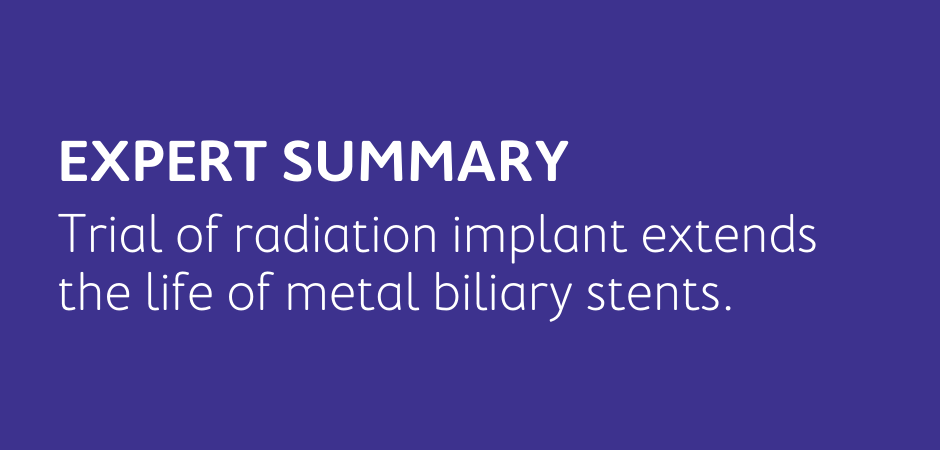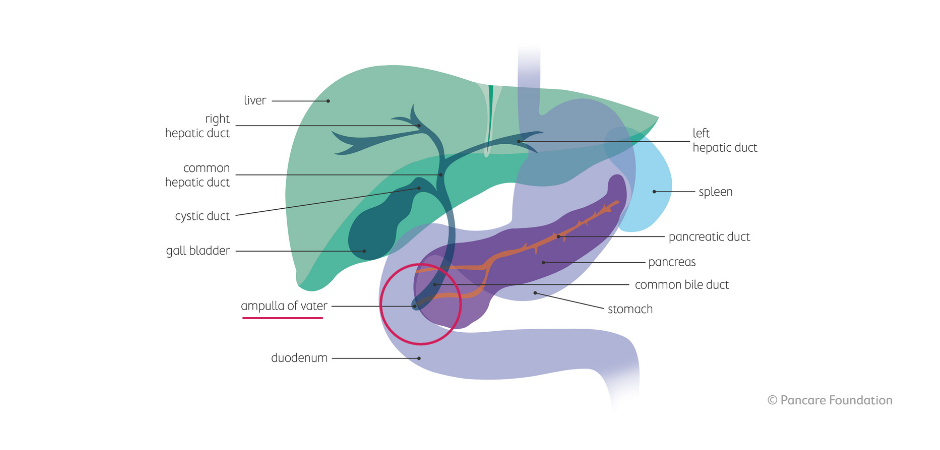
Important implications for the prevention of jaundice in liver and pancreatic cancer
Key messages from Wang et al. World Journal of Clinical Cases 2021; 9(4): 801-11
- This small randomised controlled trial examined the safety and efficacy of the use of micro-low-dose-rate irradiating iodine particles (iodine-125 seed strand implantation) with metal biliary stents to improve survival in patients with bile duct cancer (e.g. cholangiocarcinoma) or peri-ampullary cancer in the area surrounding the bile ducts near the opening to the small intestine or duodenum, which is called the ampulla of vater.

- The authors were aiming to understand whether the combination stent with iodine-125 seed strand implantation would prolong the time to stent dysfunction or failure and improve survival for those with obstructive jaundice, a common effect of these aggressive cancers.
- The results were significant: the combined stent lasted longer than the stent alone (9 vs 6 months, respectively), and the group with the combined stent lived longer than the control group (11 vs 7 months, respectively).
- Postoperative liver function improved in all patients, and there were no differences between the groups in terms of technical success of stenting, acute preoperative or postoperative outcomes, indicating that risk profiles of the combined and control stents were similar.
- In summary, the combination of iodine-125 seed strand implantation combined with stenting was safe and effective in removing biliary blockage, improving liver function, prolonging the function of the stent and improving overall survival of those with malignant obstructive jaundice.
Discussion points from expert reviewer, Mr Daniel Croagh
One of the main problems for patients with pancreatic and biliary tract cancer is recurrent jaundice and infection due to biliary stent blockage. This can lead to significant reductions in survival.
Much work has been done to improve stent patency including the use of metal as opposed to plastic stents and the use of covered vs uncovered stents.
There is still a lot of debate as to the best approach for these patients. In this recent, small single-centre randomised controlled trial (Wang et al. WJCC 2021), the addition of radioactive iodine strands to conventional metal stents was examined in patients with presumed malignant strictures secondary to hilar cholangiocarcinoma, gall bladder cancer, pancreatic cancer or malignant hilar lymphadenopathy.
The authors found longer stent patency and longer survival with the addition of radioactive iodine presumably due to the radiation resulting in less tumour in growth and less bile duct hyperplasia (overgrowth) at the end of the stents.
This is an interesting finding and deserves further investigation in larger and more homogeneous patient populations.
The area is likely to continue to evolve dramatically as improved systemic chemotherapy leads to longer-term survival, resulting in the need for stents that either maintain long-term patency or are capable of being replaced if needed.
About Mr Daniel Croagh, Pancare Medical Advisor

Daniel Croagh is a liver, pancreas and biliary surgeon working predominantly at Monash Medical Centre and Jessie Macpherson Private Hospital in Melbourne.
He undertook surgical training St Vincent’s Hospital during which time he also obtained a PhD in stem cell biology at Peter MacCallum Cancer Centre.
His Fellowship training was at Monash Medical Centre and the Liver Transplant Unit at the Queen Elizabeth Hospital in Birmingham, UK.
Mr Croagh’s areas of special interest include hepatobiliary endoscopy (endoscopic ultrasound and endoscopic retrograde cholangiopancreatography, ERCP), complex liver and pancreatic surgery for benign and malignant conditions, gall stone disease and severe pancreatitis.
He is also active in clinical and basic science research in his roles as a Senior Lecturer at Monash University and Director of Research for the department of upper gastrointestinal and hepatobiliary surgery at Monash Medical Centre.
Reference
Wang HW, Li XJ, Li SJ, Lu JR, He DF. Biliary stent combined with iodine-125 seed strand implantation in malignant obstructive jaundice. World J Clin Cases 2021; 9(4): 801-811.
Read more . . .
